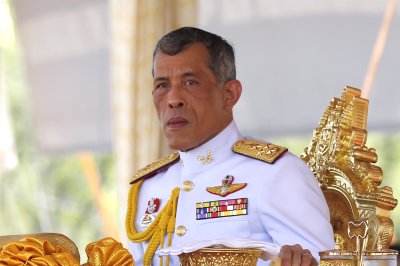
Thai King Maha Vajiralongkorn, seen here as crown prince in 2016. An American academic has been arrested and charged in Thailand on accusations of insulting the monarchy and faces up to 15 years’ imprisonment if convicted. File Photo by Rungroj Yongrit/European Pressphoto Agency
April 9 (UPI) — An American academic has been arrested in Thailand on accusations of insulting the monarchy, prompting the United States late Tuesday to express alarm and to urge authorities to respect freedom of expression.
Dr. Paul Chambers, a Thai studies scholar and lecturer at Thailand’s Naresuan University, turned himself in to authorities at Mueang Phitsanulok Police Station at 9 a.m. local time Tuesday on a court-issued warrant and was taken into pre-trial detention, according to Thai Lawyers for Human Rights.
Representatives from the group of human rights lawyers and social activists, staff from the U.S. Embassy in Thailand, six professors from his university and an interpreter were present when Chambers surrendered to authorities at the central Thailand police station, the group said.
He was arrested under a Feb. 27 charge sheet citing Section 112 of the lese-majeste Criminal Code, which states: “Whoever defames, insults or threatens the King, the Queen, the Heir-apparent or the Regent shall be punished with imprisonment of three to 15 years.” He has also been charged under Thailand’s Computer Crime Act.
Chambers has been denied bail, the court citing him as a potential flight risk and pointing to the severity of the penalty he faces.
According to Thai Lawyers for Human Rights, the charges stem from an Oct. 11 English-language post published on the website of Singaporean’s ISEAS-Yusof Ishak Institute.
The post appears to have been a brief introduction or advertisement for an academic webinar on Thai studies, in which Chambers gave a talk on the Thai military.
“The allegedly offensive content appears to have been part of an event description introducing the seminar’s topic and speakers — not an authored article by Dr. Paul himself,” the group said.
Chambers denies posting the blurb or being associated with the website. He also denies knowing the person who created the website but acknowledged that he is aware of its existence and that it is well known in the academic field of Southeast Asian studies, Thai Lawyers for Human Rights said.
Tammy Bruce, a State Department spokesperson, in a statement Tuesday night, said they are “closely monitoring the situation.”
“The United States is alarmed by the arrest of U.S. citizen Paul Chambers in Thailand on lese majeste charges and the Computer Crimes Act,” she said. “We are in communication with Thai authorities regarding this case.”
According to Human Rights Watch, Chambers has been a target of royalist and untraconsevative groups for years who have spread disinformation about him online and have led a campaign to see him arrested.
“The baseless prosecution of Paul Chambers poses a serious threat to academic freedom and free speech in Thailand,” Elaine Pearson, Asia director at HRW, said in a statement.
Thailand’s lese-majeste laws have attracted condemnation for years over their use in detaining activists, human rights defenders and critics of the monarchy.
Bruce said Chambers’ arrest reinforces the State Department’s “longstanding concerns” about the lese majeste laws and that they continue to urge Thai authorities to respect freedom of expression and ensure that laws are not used to stifle permitted expression.”
“As a treaty ally of Thailand, we will closely monitor this issue and advocate for the fair treatment of Paul Chambers,” she said.
In late January, a group of United Nations experts condemned Thailand’s continued use of the law, stating that it consistently finds the detention of individuals under Section 112 to be “arbitrary when it resulted from the exercise of the freedom of expression.”
Since 2020, more than 270 people have been detained, prosecuted and punished under the lese-majeste laws, according to the U.N. said.
“Lese-majeste laws have no place in a democratic country,” the U.N. experts said in a statement.
“The widespread use of [the] law to punish human rights defenders, members of the political opposition, social activists, journalists and ordinary citizens who are merely expressing their views peacefully creates a chilling effect, silencing legitimate political expression.”